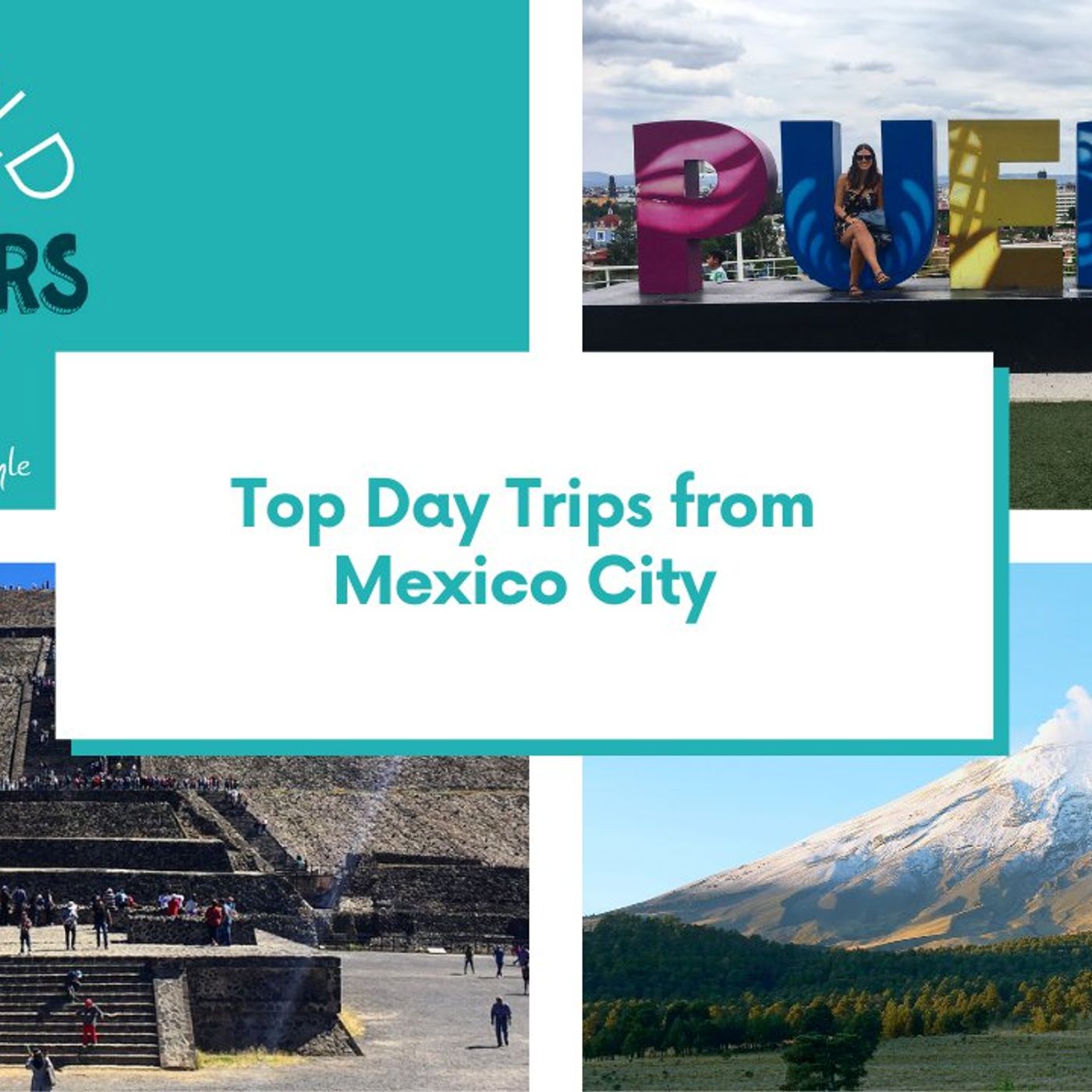
This week on the podcast we are talking about our top day trips to take from Mexico City! Being one of the largest and most diverse countries in the world, there is a ton to keep you busy in Mexico City, but if you're there for more than a few days it can be great to get outside of the city and explore some of the surrounding historical locations, pueblos, cities, and national parks. In this episode, we share some of our top recommendations for how to spend a day trip outside of Mexico City, including the pyramids of Teotihuacan, hiking in Nevado de Toluca, Tepoztlan, Puebla, and more. Enjoy!
Notes from this episode:
Top Options:
Pyramids at Teotihuacán
From Wikipedia: “Teotihuacan is known today as the site of many of the most architecturally significant Mesoamerican pyramids built in the pre-Columbian Americas. At its zenith, perhaps in the first half of the first millennium (1 AD to 500 AD), Teotihuacan was the largest city in the pre-Columbian Americas, with a population estimated at 125,000 or more,[2][3] making it at least the sixth-largest city in the world during its epoch.[4]”
A popular trip is to do a sunrise hot air balloon
You can take the bus or get an Uber. There are also lots of Airbnb experiences and tours
Tepoztlán, Morelos
90 km and about 2hrs from CDMX.
You can find tours that go there, very easy to do yourself by going to the south bus station and buying a bus fair
San Miguel de Allende, Guanajuato
~250km and closer to 3.5hrs in car
Probably better to stay overnight, but many people make a day trip out of it
Nevado de Toluca
From wiki: Nevado de Toluca is a stratovolcano in central Mexico, located about 80 kilometres (50 mi) west of Mexico City near the city of Toluca. It is the fourth highest of Mexico's peaks, after Pico de Orizaba, Popocatépetl and Iztaccíhuatl. The volcano and the area around it is now a national park.
There are a couple different hiking options in the half day range, it’s cold and at high elevation so you should be a strong hiker and accustomed to the elevation
Taxco
185 km and 2.5hrs from CDMX in Guerrero state it’s known as one of the most beautiful states in Mexico
From wiki: It is a small city and administrative center of Taxco de Alarcón Municipality located in the Mexican state of Guerrero. Taxco is located in the north-central part of the state, 36 kilometres (22 miles) from the city of Iguala, 135 kilometres (84 miles) from the state capital of Chilpancingo and 170 kilometres (106 miles) southwest of Mexico City.
The city is heavily associated with silver, both with the mining of it and other metals and for the crafting of it into jewelry, silverware and other items. Today, mining is no longer a mainstay of the city's economy. The city's reputation for silverwork, along with its picturesque homes and surrounding landscapes, have made tourism the main economic activity.
Popocatepetl Volcano
From wiki:
Popocatépetl is 70 km (43 mi) southeast of Mexico City, from where it can be seen regularly, depending on atmospheric conditions. Until recently, the volcano was one of three tall peaks in Mexico to contain glaciers,[8] the others being Iztaccihuatl and Pico de Orizaba. In the 1990s, the glaciers such as Glaciar Norte (North Glacier) greatly decreased in size, partly due to warmer temperatures but largely due to increased volcanic activity.[9] By early 2001, Popocatépetl's glaciers were gone; ice remained on the volcano, but no longer displayed the characteristic features of glaciers such as crevasses.[10][11][12]
Popocatépetl (Spanish pronunciation: [popokaˈtepetl] (audio speaker iconlisten); Nahuatl: Popōcatepētl Nahuatl pronunciation: [popoːkaˈtepeːt͡ɬ]) is an active stratovolcano located in the states of Puebla, Morelos, and Mexico in central Mexico. It lies in the eastern half of the Trans-Mexican volcanic belt. At 5,426 m (17,802 ft)[1] it is the second highest peak in Mexico, after Citlaltépetl (Pico de Orizaba) at 5,636 m (18,491 ft).
It is linked to the twin volcano of Iztaccihuatl to the north by the high saddle known as the "Paso de Cortés".[5] Izta-Popo Zoquiapan National Park, wherein the two volcanoes are located, is named after them.[6][7]
Lava erupting from Popocatépetl has historically been predominantly andesitic, but it has also erupted large volumes of dacite.[13] Magma produced in the current cycle of activity tends to be a mixture of the two with the andesites being rich in magnesium.[14]
Within the city, but still more of a half-day trip:
Xocimilco
Santa Fe
Next on the list:
Puebla
Cuernavaca
Toluca
view more
Notes from this episode:
Top Options:
Pyramids at Teotihuacán
From Wikipedia: “Teotihuacan is known today as the site of many of the most architecturally significant Mesoamerican pyramids built in the pre-Columbian Americas. At its zenith, perhaps in the first half of the first millennium (1 AD to 500 AD), Teotihuacan was the largest city in the pre-Columbian Americas, with a population estimated at 125,000 or more,[2][3] making it at least the sixth-largest city in the world during its epoch.[4]”
A popular trip is to do a sunrise hot air balloon
You can take the bus or get an Uber. There are also lots of Airbnb experiences and tours
Tepoztlán, Morelos
90 km and about 2hrs from CDMX.
You can find tours that go there, very easy to do yourself by going to the south bus station and buying a bus fair
San Miguel de Allende, Guanajuato
~250km and closer to 3.5hrs in car
Probably better to stay overnight, but many people make a day trip out of it
Nevado de Toluca
From wiki: Nevado de Toluca is a stratovolcano in central Mexico, located about 80 kilometres (50 mi) west of Mexico City near the city of Toluca. It is the fourth highest of Mexico's peaks, after Pico de Orizaba, Popocatépetl and Iztaccíhuatl. The volcano and the area around it is now a national park.
There are a couple different hiking options in the half day range, it’s cold and at high elevation so you should be a strong hiker and accustomed to the elevation
Taxco
185 km and 2.5hrs from CDMX in Guerrero state it’s known as one of the most beautiful states in Mexico
From wiki: It is a small city and administrative center of Taxco de Alarcón Municipality located in the Mexican state of Guerrero. Taxco is located in the north-central part of the state, 36 kilometres (22 miles) from the city of Iguala, 135 kilometres (84 miles) from the state capital of Chilpancingo and 170 kilometres (106 miles) southwest of Mexico City.
The city is heavily associated with silver, both with the mining of it and other metals and for the crafting of it into jewelry, silverware and other items. Today, mining is no longer a mainstay of the city's economy. The city's reputation for silverwork, along with its picturesque homes and surrounding landscapes, have made tourism the main economic activity.
Popocatepetl Volcano
From wiki:
Popocatépetl is 70 km (43 mi) southeast of Mexico City, from where it can be seen regularly, depending on atmospheric conditions. Until recently, the volcano was one of three tall peaks in Mexico to contain glaciers,[8] the others being Iztaccihuatl and Pico de Orizaba. In the 1990s, the glaciers such as Glaciar Norte (North Glacier) greatly decreased in size, partly due to warmer temperatures but largely due to increased volcanic activity.[9] By early 2001, Popocatépetl's glaciers were gone; ice remained on the volcano, but no longer displayed the characteristic features of glaciers such as crevasses.[10][11][12]
Popocatépetl (Spanish pronunciation: [popokaˈtepetl] (audio speaker iconlisten); Nahuatl: Popōcatepētl Nahuatl pronunciation: [popoːkaˈtepeːt͡ɬ]) is an active stratovolcano located in the states of Puebla, Morelos, and Mexico in central Mexico. It lies in the eastern half of the Trans-Mexican volcanic belt. At 5,426 m (17,802 ft)[1] it is the second highest peak in Mexico, after Citlaltépetl (Pico de Orizaba) at 5,636 m (18,491 ft).
It is linked to the twin volcano of Iztaccihuatl to the north by the high saddle known as the "Paso de Cortés".[5] Izta-Popo Zoquiapan National Park, wherein the two volcanoes are located, is named after them.[6][7]
Lava erupting from Popocatépetl has historically been predominantly andesitic, but it has also erupted large volumes of dacite.[13] Magma produced in the current cycle of activity tends to be a mixture of the two with the andesites being rich in magnesium.[14]
Within the city, but still more of a half-day trip:
Xocimilco
Santa Fe
Next on the list:
Puebla
Cuernavaca
Toluca
More Episodes
2017 Year in Review
 2017-12-14
2017-12-14
 30
30
 2017-12-14
2017-12-14
 30
30
Being Away From Home During the Holidays
 2017-12-07
2017-12-07
 14
14
 2017-12-07
2017-12-07
 14
14
Balancing Work With Travel
 2017-11-30
2017-11-30
 16
16
 2017-11-30
2017-11-30
 16
16
Your Common Travel Questions Answered
 2017-11-23
2017-11-23
 25
25
 2017-11-23
2017-11-23
 25
25
Our Top Ten Favourite Cities
 2017-11-16
2017-11-16
 24
24
 2017-11-16
2017-11-16
 24
24
Hiking the West Coast Trail
 2017-11-02
2017-11-02
 13
13
 2017-11-02
2017-11-02
 13
13
First Impressions of Mexico City
 2017-10-19
2017-10-19
 33
33
 2017-10-19
2017-10-19
 33
33
Life Update: Vamos a Mexico
 2017-10-12
2017-10-12
 21
21
 2017-10-12
2017-10-12
 21
21
TWW on the Slow Your Home Podcast
 2017-09-28
2017-09-28
 38
38
 2017-09-28
2017-09-28
 38
38
How to Create While You Travel
 2017-09-21
2017-09-21
 43
43
 2017-09-21
2017-09-21
 43
43
How to Find Community When You Travel
 2017-09-14
2017-09-14
 25
25
 2017-09-14
2017-09-14
 25
25
Montreal & Toronto
 2017-09-07
2017-09-07
 8
8
 2017-09-07
2017-09-07
 8
8
Choosing a Travel Style that Makes You Happy
 2017-08-31
2017-08-31
 21
21
 2017-08-31
2017-08-31
 21
21
012345678910111213141516171819
Create your
podcast in
minutes
- Full-featured podcast site
- Unlimited storage and bandwidth
- Comprehensive podcast stats
- Distribute to Apple Podcasts, Spotify, and more
- Make money with your podcast
It is Free
- Privacy Policy
- Cookie Policy
- Terms of Use
- Consent Preferences
- Copyright © 2015-2024 Podbean.com






